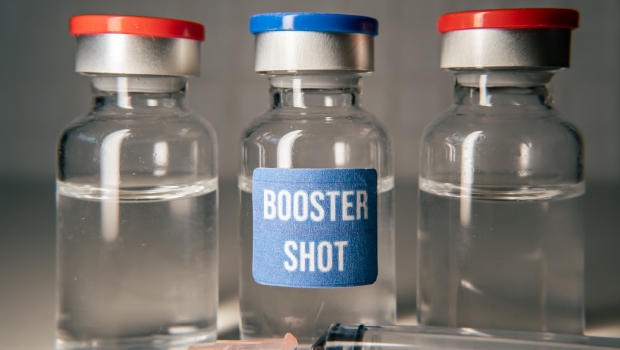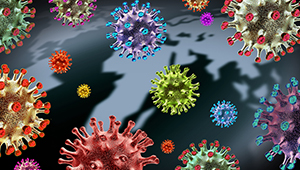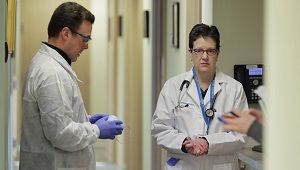Trial confirms safety of mix-and-match COVID-19 vaccine booster

Lisa Jackson, MD, MPH, explains results support boosting with Moderna, Pfizer, or Johnson & Johnson vaccine
In adults who had previously received a full regimen of any of 3 COVID-19 vaccines granted Emergency Use Authorization (EUA) or approved by the U.S. Food and Drug Administration (FDA), an additional booster dose of any of these vaccines was safe and prompted an immune response, according to preliminary clinical trial results reported in The New England Journal of Medicine. Lisa A. Jackson, MD, MPH, Kaiser Permanente Washington Health Research Institute senior investigator and Washington Permanente Group physician, is a study coauthor.
The findings served as the basis for recommendations by the FDA and the Centers for Disease Control and Prevention (CDC) in late fall 2021 to permit mix-and-match COVID-19 booster vaccinations in the U.S. Additional data from the ongoing phase 1/2 trial — sponsored by the National Institute of Allergy and Infectious Diseases (NIAID), part of the National Institutes of Health — are expected in the coming months.
Mix-and-match trial findings
The new report describes findings from 458 adults who had been fully vaccinated with any of 3 EUA COVID-19 vaccines at least 12 weeks prior to enrollment and who had no reported history of infection with SARS-CoV-2 (the virus that causes COVID-19). At enrollment, a single booster dose was administered to each participant: 150 received Janssen/Johnson & Johnson’s vaccine, 154 received Moderna’s vaccine, and 154 received Pfizer-BioNTech’s vaccine. Depending on which primary vaccine regimen a participant had received, the booster vaccine was either different than the original vaccine (mixed, or heterologous) or the same (matched, or homologous).
Dr. Jackson said that the study team based the clinical trial design on established vaccine science. "We know that the mixing-and-matching approach can lead to strong and long-lasting immune responses and that could help us against COVID-19 variants."
The trial participants kept diaries of any side effects. More than half of participants reported headache, pain at the injection site, muscle aches, and malaise. No serious vaccine-related adverse events were reported.
All combinations of primary and booster vaccine resulted in increased neutralizing antibody levels. Likewise, all primary-boost combinations increased binding antibody levels. For each primary EUA COVID-19 vaccine, heterologous boosts elicited similar or higher antibody responses as compared to responses to a homologous booster. Taken together, the investigators concluded, “these data strongly suggest that homologous and heterologous booster vaccine doses will increase protective efficacy against symptomatic SARS-CoV-2 infection.”
These interim results cover available immunogenicity data through the initial 29 days following booster vaccination. Investigators will continue to follow participants for 1 year to assess what impact booster vaccination has on longer-term immune responses. Additional arms of the trial may test other investigational, EUA, or FDA-approved COVID-19 vaccines and/or vaccines based on SARS-CoV-2 variants as the boosting vaccine.
Dr. Jackson said, "KPWHRI will continue to contribute to the mix-and-match vaccine booster trial in addition to our other COVID-19 vaccine work, including ongoing safety and efficacy monitoring."
The trial began in May 2021 and is continuing to enroll participants. Its principal investigators are Robert L. Atmar, M.D., of Baylor College of Medicine, Houston; and Kirsten E. Lyke, M.D., of the University of Maryland School of Medicine, Baltimore. It is being conducted through NIAID’s Infectious Diseases Clinical Research Consortium, a clinical trials network that encompasses NIAID’s longstanding Vaccine and Treatment Evaluation Units (VTEUs). Additional information about the trial, including a listing of trial sites enrolling volunteers, is available at ClinicalTrials.gov using the identifier NCT04889209.
NIAID grants supporting this research are UM1AI48372, UM1AI148373, UM1AI148450, UM1AI148452, UM1AI148573, UM1AI148574, UM1AI148575, UM1AI148576, UM1AI148684, and UM1AI148689, with support from the NIAID Collaborative Influenza Vaccine Innovation Centers (CIVICs) contract 75N93019C00050.
Based on a news release from NIAID.
Vaccine safety

COVID-19 vaccines and serious reactions: 3 questions answered
Jen Nelson, PhD, talks about monitoring reactions to the mRNA vaccines.
COVID-19 vaccines

Moderna vaccine has durable response against variants
Findings in Science magazine called “encouraging” for use of vaccine against Delta and other emerging variants.
Research

‘Fighting back’ against COVID-19: Remembering a historic trial
Lisa Jackson, MD, MPH, Kaiser Permanente Washington senior investigator, recounts the genesis of a groundbreaking vaccine.



